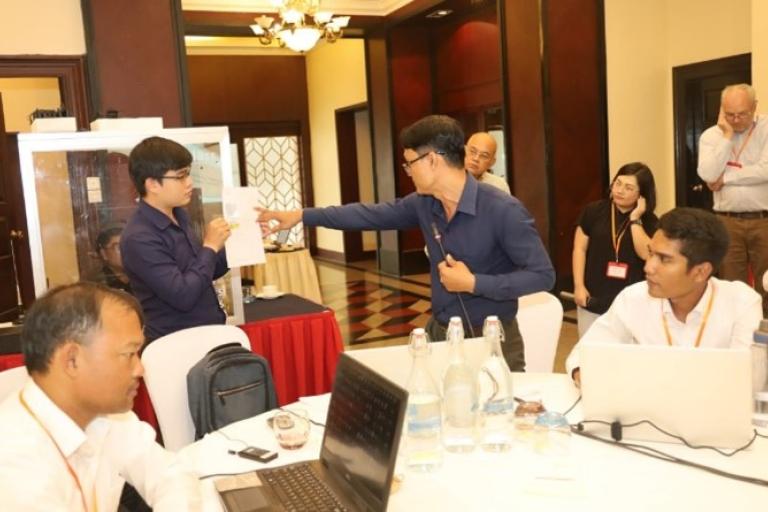Strengthening Impact-based Forecasting in Cambodia
Cambodia is striving to strengthen its multi-hazard early warning systems to protect vulnerable communities from the potential social and economic losses related to the impacts of weather, climate and water hazards.

Cambodia is striving to strengthen its multi-hazard early warning systems to protect vulnerable communities from the potential social and economic losses related to the impacts of weather, climate and water hazards. On 4 October, the Government, the United Nations and local representatives, participating in the first national consultation workshop of the Early Warnings for All initiative, pledged to improve national disaster preparedness and to ensure that warnings of pending hazards translate into early, effective action at the local level. This was followed-up by a two-week workshop, from 23 October to 3 November at the Cambodia Department of Meteorology, to strengthen the capacity of operational forecasters in short- and medium range forecasting of severe weather events and on the provision of impact-based forecasting and warning services.
Cambodia has a tropical climate with a monsoon-driven rainy season and an El Nino Southern Oscillation (ENSO) driven inter-annual climate variations. The country is characterized by coastal, river plain and mountainous ecosystems that are prone to hydrometeorological hazards such as storms, flash, coastal and river floods, and drought. Rapid urbanization, the exploitation of natural resources and deforestation have increased the risks of such hazards for vulnerable people.
The WMO Severe Weather Forecasting Programme (SWFP), which reinforces the capacity of National Meteorological and Hydrological Services (NMHS) to deliver improved forecast and warning of severe weather to inform decision-making to reduce damages and losses, led the workshop. Through the WMO Integrated Processing and Prediction System (WIPPS) Centres, SWFP makes use of a “Cascading Forecasting Process” to improve the availability and accessibility of numerical weather prediction (NWP) products from the global level down to the regional then national levels.
In the first week of the workshop, 15 participants from the Cambodia Department of Meteorology and the Mekong River Commission (MRC) learned how to use satellite- and radar-based nowcasting products, how to interpret NWP model outputs for short- and medium-range forecasting of high-impact weather, and how to conduct verifications of the forecast and warnings that were produced.
Users of early warning services – including the National Committee for Disaster Management (NCDM), Cambodia Red Cross, Ministry of Information, Ministry of Health, Ministry of Mines and Energy, Ministry of Public Works and Transport, Royal University, WorldVision, and the UN World Food Programme (WFP) – joined the second week of training. The focus was on effectively communicating hazard impacts to end users and on defining the roles and responsibilities of the participants in implementing impact-based forecast and warning services when disasters loom. The participants worked together on Standard Operating Procedures (SOP) and supported developing Memorandum of Understanding to start implementing impact-based early warning services in Cambodia.
As a member of SWFP Southeast Asia, Cambodia is committed to continuously strengthen their capacities for early warning services through collaboration with national, regional and global partners to ensure that people are prepared to act in anticipation of a disaster.
The workshop was funded through the Climate Risk Early Warning Systems (CREWS) initiative’s Cambodia and Lao PDR project. With logistical support from the Asian Disaster Preparedness Center (ADPC), the WMO Secretariat mobilized trainers from World Meteorological Centres (WMCs), including the European Centre for Medium-Range Weather Forecasts (ECMWF), the Met Office (United Kingdom), and WMC Beijing. The Hong Kong and Tokyo Regional Specialized Meteorological Centres (RSMC) and the Ha Noi Regional Forecast Support Centre (RFSC) as well as experts from the Philippines and Ireland also participated as trainers. WFP is the lead organization for implementation of the Early Warnings for All initiative in Cambodia.

